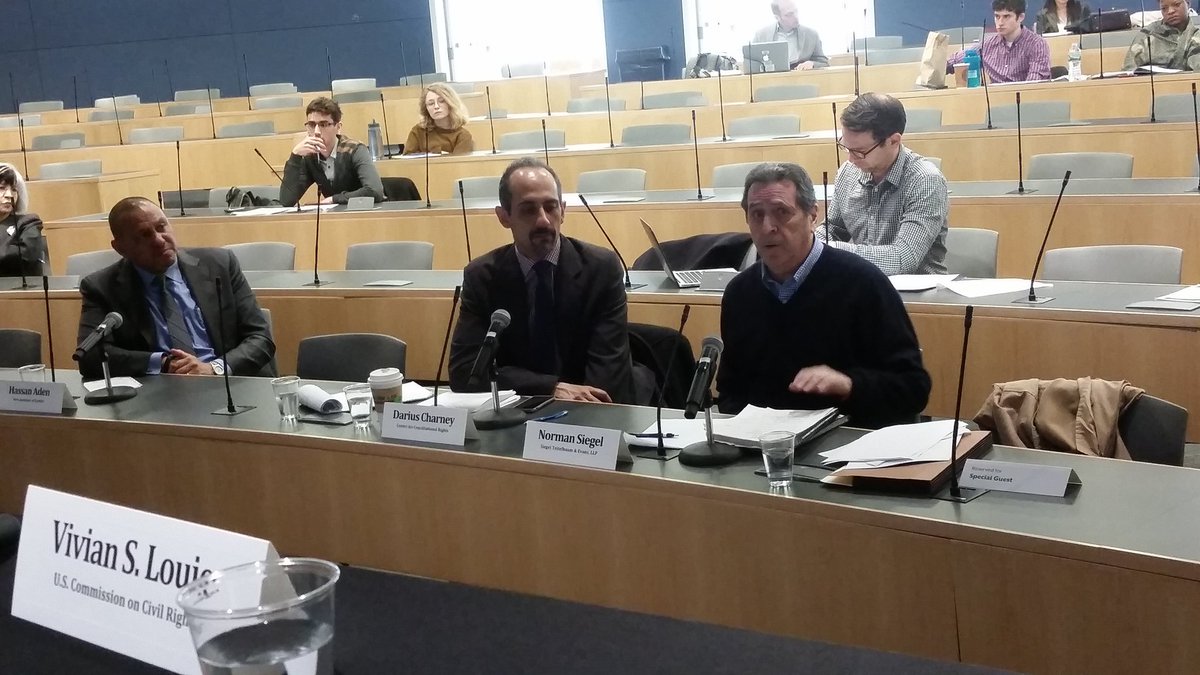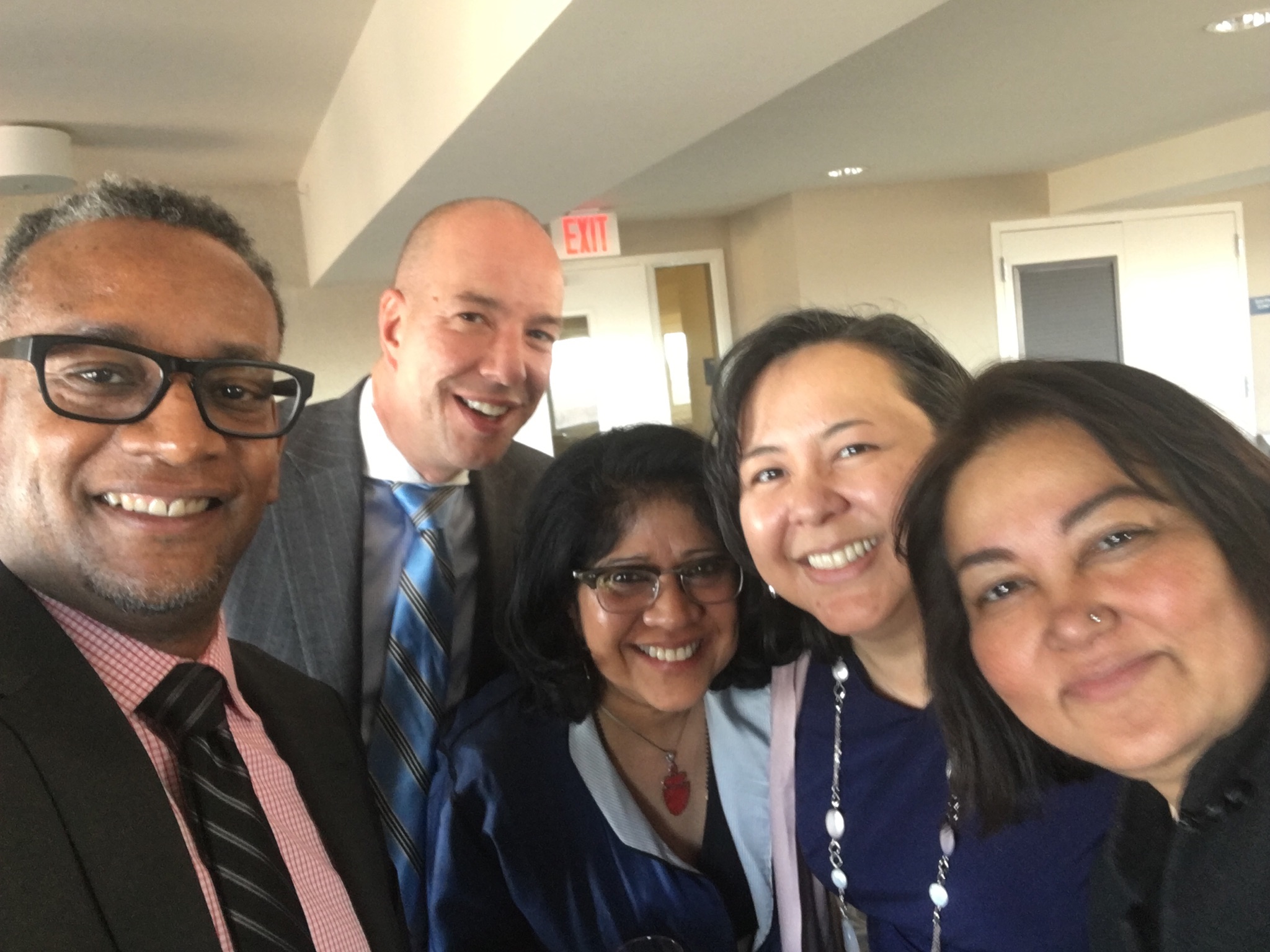This is CCR's weekly "Frontlines of Justice" news round-up, keeping you in the loop about what we've been up to and what's coming soon. Check it out every Monday, your one-stop-shop for CCR opinions, news coverage, reports from court appearances, upcoming events, and more!
Calling for police accountability
Darius Charney, center, testifies before the New York Advisory Committee to the U.S. Commission on Civil Rights
CCR senior staff attorney Darius Charney, the lead attorney in CCR's historic stop-and-frisk case, testified before the New York Advisory Committee to the U.S. Commission on Civil Rights. Darius addressed the key elements necessary to create an effective accountability system within the NYPD.
Darius told the panel, “The goal of an effective internal accountability system is to create an organizational culture, extending through all levels of the law enforcement agency, from senior management down to the line officers, that values and incentivizes fair, impartial, and constitutional policing. No single, isolated reform measure can accomplish this goal.”
He then outlined a comprehensive reform package, one that relies on supervisory oversight of on-the-street police conduct, performance evaluation that values quality over quantity, an “early warning” system for police officers who demonstrate bias, strengthening the disciplinary system for officer misconduct, and “robust and comprehensive data collection and analysis.”
During a week when issues of police accountability and transparency have sprung back into the headlines, with the leaking of NYPD Officer Daniel Pantaleo’s disciplinary records, CCR’s insight is especially crucial. Officer Pantaleo put Eric Garner in a chokehold in 2014, killing him, sparking protests across the country using Garner’s last words as the rallying cry—“I can’t breathe.” Although a grand jury declined to indict Pantaleo in Garner’s death, the leaked records suggest that Pantaleo demonstrated a pattern of violent behavior, with seven disciplinary complaints and 14 individual allegations lodged against him.
Without the system of accountability in place that Darius outlined in his testimony, dangerous members of law enforcement like Pantaleo go unchecked, with tragic results. There is no question that it is beyond time for the NYPD, and police departments nationwide, to implement such oversight.
Read Darius’ full testimony here.
CCR engages international human rights bodies
When the Kenyan human rights lawyer Maina Kiai, the United Nations Special Rapporteur on the rights to freedom of peaceful assembly and of association, visited the U.S. last July, CCR met with him about issues facing activists here and followed up with a written submission focusing on Muslim profiling, surveillance of Black protesters, and suppression of Palestine solidarity activists. Kiai gave testimony to the Human Rights Commission of the U.S. Congress last Tuesday and urged them to take action in support of human rights. Speaking of “an epic global struggle,” he said, “the point today is not to highlight specific trees; it is to show the forest — and to underscore that this forest is quite literally on fire.”
CCR’s strong belief in international law, universal jurisdiction, and the global movement for human rights has also led to our engagement with the regional body, the Inter-American Commission. Unsurprisingly, the new administration appears to have contempt for all of the above and, earlier this week, for the first time ever, the U.S. refused to appear during a series of hearings held there. Learn more about CCR’s historic engagement with the Inter American Commission on a significant hearing on criminal justice here, and on the issue of Guantánamo here.
Fighting Trumpism: CCR joins ACLU and Amnesty USA to talk civil liberties and human rights
Vince Warren, ACLU’s Anthony J. Romero, CWGL faculty director & former CCR board treasurer Radhika Balakrishnan, Amnesty USA’s Margaret Huang, and CWGL executive director Krishanti Dharmaraj
Last Wednesday, CCR executive director Vince Warren joined ACLU executive director Anthony J. Romero and Amnesty USA executive director Margaret Huang for Moving Forward: Defending Civil Liberties and Human Rights, a talk held by the Center for Women’s Global Leadership (CWGL) at Rutgers University. CWGL faculty director & former CCR board treasurer Radhika Balakrishnan moderated the panel and talkback. During the discussion, Vince called for vigilance and resistance, noting that at CCR, “We fight power, especially the egregious power we see today. But we also build power with movement groups. It’s in that context that our immigration work has happened. … The rhetoric of criminalization surrounding immigrant and minority communities is so deeply hurtful and dangerous. It is essentially enabling and empowering a massive set of deportation mechanisms. It has happened before and if we’re not vigilant, it can happen again.”
This was truly a lively and riveting discussion, and we’re grateful to CWGL for the opportunity to participate and to Radhika and our colleagues at ACLU and Amnesty USA for the conversation. Watch video of the event on CWGL’s Facebook page.



